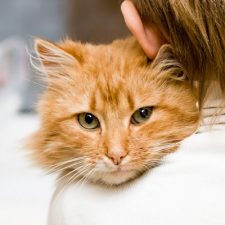It isn’t always easy to tell how cats are feeling. After all, our feline pals spend the majority of their time sleeping! They can also be quite secretive, especially when it comes to letting on that they don’t feel well. Read on as an Anderson, IN vet offers some tips on monitoring Fluffy’s health.
Veterinary Care
First things first: make sure Fluffy sees the vet regularly. Exams and screenings greatly increase the chances of medical issues being detected early. You may want to consider enrolling your furball in a wellness care plan. This will allow you to even out the cost of your pet’s care into monthly payments, making things easier on your budget.
Weigh Your Kitty
Sudden changes in Fluffy’s weight can be signs of health problems. Even a gain or loss of a few pounds can be a red flag. Of course, it’s not always easy to keep track of what your kitty weighs, especially if she has long hair. That’s why we recommend weighing your cat regularly. Weigh yourself, and then pick your cat up and weigh yourself again. The difference between the two numbers is your pet’s weight.
Feeding Schedule
Fill Fluffy’s food and water bowls at the same time each day. This will help you monitor how much she is eating and drinking.
Brushing
Brushing Fluffy daily is beneficial for several reasons. It will remove dead fur and dust from her coat, which will in turn reduce hairballs. It’s also a good way to spend time with your furball. Inspect your feline pal during these beauty sessions. Look for swelling, cuts, heat, and other warning signs.
Litterbox Monitoring
Cleaning litterboxes isn’t the best part of having a cat, but it is necessary. While you’re at it, watch for changes in the amount, color, texture, or odor of your kitty’s waste. You may also want to ask your vet for advice on using litters that change color if certain medical issues are detected.
Pay Attention
Finally, just pay attention to your furball. Keep an eye out for unusual behavior or signs of illness. Some things to watch for include hiding, poor grooming, respiratory issues, fever, and/or uncharacteristic behavior or vocalizations. Call your vet immediately if you notice anything unusual.
Please feel free to contact us, your Anderson, IN vet clinic, anytime. We’re dedicated to offering excellent veterinary care.








